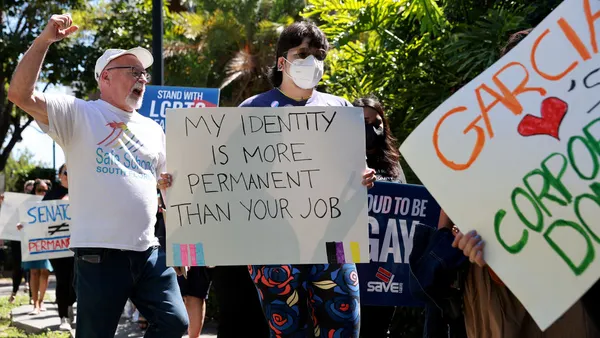Dive Brief:
- The 3rd U.S. Circuit Court of Appeals has vacated and remanded a trial court's decision regarding the discrimination and retaliation claims of a Philadelphia-based City Fitness instructor who said she was demoted and fired because of her skin color (Pedro v. City Fitness, LLC, et al. No. 18-1799 (3rd Cir. Feb. 20, 2020)).
- When Carmencita Pedro, who describes herself as "dark-skinned and of Puerto Rican ancestry," asked to teach classes at a new City Fitness location nearly two years after her start date, the managing partner denied her request, saying "[y]ou know, the demographic in that neighborhood is very white-bred and I just don't think you would fit in," according to court documents. Despite this, Pedro was later asked to serve as a substitute teacher at that location. After a promotion, Pedro began teaching a class at the location but was later told by the same manager who originally denied her request that she would be replaced by another instructor "because the demographic is more white." Pedro was the subject of several written complaints from club members and other instructors. One person alleged Pedro approached her in a Whole Foods, attempting to resolve the issue she complained about originally. Pedro's manager notified her of her demotion the next day, saying "[y]ou're black and you were probably angry that she didn't like your class, so you saw her in the market and confronted her." Days later, Pedro filed a complaint with the U.S. Equal Employment Opportunity Commission and told her manager and others she had done so. She was fired later that day, and a white woman filled her position.
- The district court granted the employer's request to dismiss the case. But the 3rd Circuit disagreed, pointing out that the color of her skin appeared to be a factor in the decisions and that she was fired "only hours" after she told a manager that she had complained to the EEOC.
Dive Insight:
Experts have said that managers and supervisors are a leading cause of discrimination claims. To reduce risk of legal action, employers should adopt anti-discrimination policies and make sure that managers are trained on workplace policies. Periodic training on federal, state and local laws on bias and retaliation is also important for those in supervisory roles. A robust reporting system can help, too, experts have said. HR can also examine corporate culture and develop business ethics and conduct that support a diverse workplace.
Employers should be also careful when an adverse employment action follows on the heels of protected activity such as filing a complaint with the EEOC, unless they have a legitimate, non-discriminatory reason for the action, sources previously told HR Dive. A short period of time between the protected activity and an adverse employment action can create an inference of retaliation. The appeals court noted that Pedro's claim of retaliation was supported by the fact that there was "only hours" between the firing and her informing club leadership of her EEOC complaint.
While timing alone can establish a prima facie case of retaliation, it's not always enough to carry a retaliation claim. For example, one year between a complaint and firing didn't show bias, the 5th Circuit recently ruled and, similarly, the 11th Circuit said a termination that occurred eight months after filing an EEOC complaint wasn't retaliation.











